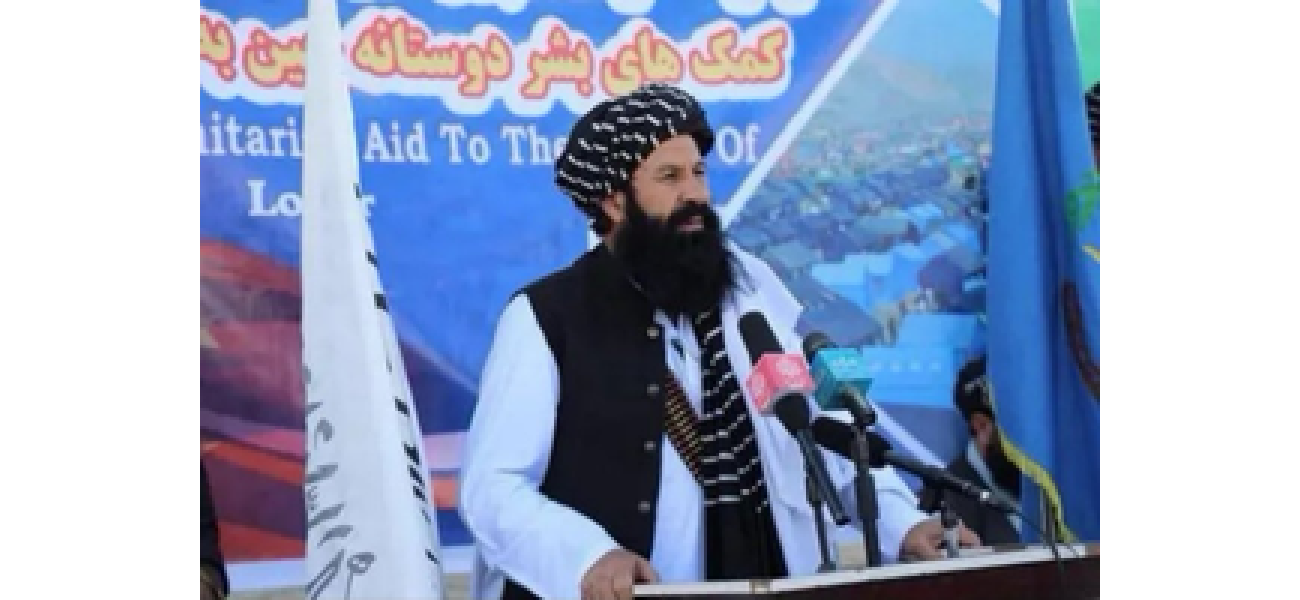Thousands gather for funeral of Taliban official slain by Islamic State bomber.
Thousands attend funeral of Taliban minister killed in Kabul bombing claimed by Islamic State. Funeral held in Paktia province for Khalil Haqqani, minister for refugees and repatriation.
December 12th 2024.

Human-Like Text:
On Thursday, thousands of individuals gathered for a somber occasion - the funeral of a Taliban minister who lost his life in a devastating suicide bombing in Kabul. The attack was claimed by the Islamic State group, adding a layer of complexity to the already tense situation in Afghanistan. The funeral took place in Paktia province, located in the eastern region of the country. It was a solemn event, as mourners paid their respects to Khalil Haqqani, the minister for refugees and repatriation and the most high-profile victim of an assault since the Taliban regained control of the government three years ago.
Haqqani was one of six people who tragically lost their lives in the blast that occurred at his ministry on Wednesday. As a member of the Cabinet, his death has left a significant void in the leadership of the country. What made this loss even more poignant was the fact that Haqqani was the uncle of Sirajuddin Haqqani, the acting interior minister and leader of a powerful faction within the Taliban. Both Haqqanis have been considered high-value targets by the United States, with a bounty placed on their heads.
The funeral was attended by many high-ranking officials, including Foreign Minister Amir Khan Muttaqi and Deputy Prime Minister Maulvi Abdul Kabir. Security was tight, as armed men guarded the coffin draped in the Taliban flag. Sermons and eulogies were broadcasted through loudspeakers, and members of the local and international media were invited to cover the event in Garda Serai district of Paktia. The funeral was a poignant reminder of the ongoing conflicts and violence in Afghanistan, as well as the importance of honoring those who have lost their lives in service to their country.
According to a statement from the Amaq News Agency, the suicide bombing was carried out by a fighter from the Islamic State Khorasan Province, an affiliate of the Islamic State group. The statement claimed that the attacker waited for Haqqani to leave his office before detonating his device. However, an official from Paktia, speaking on the condition of anonymity, gave a different account of what happened. He stated that the assailant was able to enter the ministry despite setting off an alarm on the body scanner by claiming to have metal plates in his hands and stating that he was a refugee.
The official also shared that Haqqani was known for his compassion towards refugees and individuals with disabilities. He often made time for them and listened to their concerns, making him a beloved figure in the community. On the day of the attack, Haqqani was on his way to the ministry after praying in the compound's mosque when the bomb went off. The United Nations Mission in Afghanistan was among the many organizations to condemn the attack, stating that there is no place for terrorism in the pursuit of stability.
The neighboring country of Pakistan also expressed shock and solidarity with Afghanistan. Mohammad Sadiq, the special representative for Afghanistan, wrote on Wednesday that the government stands with Afghanistan in their fight against terrorism. The Islamic State group's affiliate has been a major rival of the ruling Taliban, and they have been responsible for previous bombings across Afghanistan. However, since the Taliban regained control of the government and US and NATO forces withdrew, suicide attacks have become rare. When they do occur, they are often aimed at minority groups, particularly the Shiite Muslim population in the capital.
On Thursday, thousands of individuals gathered for a somber occasion - the funeral of a Taliban minister who lost his life in a devastating suicide bombing in Kabul. The attack was claimed by the Islamic State group, adding a layer of complexity to the already tense situation in Afghanistan. The funeral took place in Paktia province, located in the eastern region of the country. It was a solemn event, as mourners paid their respects to Khalil Haqqani, the minister for refugees and repatriation and the most high-profile victim of an assault since the Taliban regained control of the government three years ago.
Haqqani was one of six people who tragically lost their lives in the blast that occurred at his ministry on Wednesday. As a member of the Cabinet, his death has left a significant void in the leadership of the country. What made this loss even more poignant was the fact that Haqqani was the uncle of Sirajuddin Haqqani, the acting interior minister and leader of a powerful faction within the Taliban. Both Haqqanis have been considered high-value targets by the United States, with a bounty placed on their heads.
The funeral was attended by many high-ranking officials, including Foreign Minister Amir Khan Muttaqi and Deputy Prime Minister Maulvi Abdul Kabir. Security was tight, as armed men guarded the coffin draped in the Taliban flag. Sermons and eulogies were broadcasted through loudspeakers, and members of the local and international media were invited to cover the event in Garda Serai district of Paktia. The funeral was a poignant reminder of the ongoing conflicts and violence in Afghanistan, as well as the importance of honoring those who have lost their lives in service to their country.
According to a statement from the Amaq News Agency, the suicide bombing was carried out by a fighter from the Islamic State Khorasan Province, an affiliate of the Islamic State group. The statement claimed that the attacker waited for Haqqani to leave his office before detonating his device. However, an official from Paktia, speaking on the condition of anonymity, gave a different account of what happened. He stated that the assailant was able to enter the ministry despite setting off an alarm on the body scanner by claiming to have metal plates in his hands and stating that he was a refugee.
The official also shared that Haqqani was known for his compassion towards refugees and individuals with disabilities. He often made time for them and listened to their concerns, making him a beloved figure in the community. On the day of the attack, Haqqani was on his way to the ministry after praying in the compound's mosque when the bomb went off. The United Nations Mission in Afghanistan was among the many organizations to condemn the attack, stating that there is no place for terrorism in the pursuit of stability.
The neighboring country of Pakistan also expressed shock and solidarity with Afghanistan. Mohammad Sadiq, the special representative for Afghanistan, wrote on Wednesday that the government stands with Afghanistan in their fight against terrorism. The Islamic State group's affiliate has been a major rival of the ruling Taliban, and they have been responsible for previous bombings across Afghanistan. However, since the Taliban regained control of the government and US and NATO forces withdrew, suicide attacks have become rare. When they do occur, they are often aimed at minority groups, particularly the Shiite Muslim population in the capital.
[This article has been trending online recently and has been generated with AI. Your feed is customized.]
[Generative AI is experimental.]
0
0
Submit Comment





